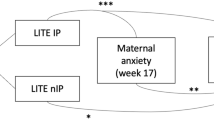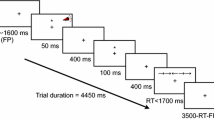Abstract
Previous research has evaluated the cognitive effects of pregnancy, yet only a handful of studies have specifically evaluated maternal attention. This will be the first study to investigate the effects of biological motherhood (M = 3.5 years postpartum) on attention network functioning. The Attention Network Test – Revised was selected to investigate mothers’ attentional network functioning during the years following childbirth. The current study examined alerting, orienting, and executive control attention scores in mothers and non-mothers. Self-report measures were also used to investigate the relationships between behaviorally tested attention and perceived stress and attentiveness. Findings indicated that mothers and non-mothers have similar alerting and orienting attention, but mothers had better executive control attention. Perceived attentiveness predicted orienting scores, with an inverse relationship between explicit feelings of attentiveness and the orienting attention response times indicates that subjective inattentiveness is related to slower orienting.

Similar content being viewed by others
Notes
Using G*Power (Faul et al. 2009), an a priori power analysis determined an N of 128 (2 groups of 64) was sufficient to reach 80% power with a 95% CI and a moderate effect size of d = 0.5. However, available funding limited our sample size of mothers to 60.
Mean executive control location scores (RTlocation incongruent – RTlocation congruent) were not different from zero (M = −0.28, SD = 29.09) = 0, t(97) = −0.924, p = .924. The participants’ RT in the location incongruent trials were the same as in the location congruent trials, suggesting no location conflict effect; therefore, executive control location scores were removed from further analyses.
References
Beeber, L. S., Schwartz, T. A., Martinez, M. I., Holditch-Davis, D., Bledsoes, S. E., Canuso, R., & Lewis, V. S. (2014). Depressive symptoms and comprised parenting in low-income mothers of infants and toddlers: Distal and proximal risks. Research in Nursing and Health, 37, 276–291. https://doi.org/10.1002/nur.21604.
Bjorklund, D. F., & Yunger, J. L. (2002). Evolutionary developmental psychology: A useful framework for evaluation of the evolution of parenting. Parenting: Science and Practice, 1, 63–66. https://doi.org/10.1080/15295192.2001.9681210.
Brett, M., & Baxendale, S. (2001). Motherhood and memory: A review. Psychoneuroendocrinology, 26(4), 339–362. https://doi.org/10.1016/S0306-4530(01)00003-8.
Bush, G., Luu, P., & Posner, M. I. (2000). Cognitive and emotional influences in anterior cingulate cortex. Trends in Cognitive Science, 4(6), 215–222. https://doi.org/10.1016/S1364-6613(00)01483-2.
Case, P. J., Hunstdale, C., Angus, C., & Janes, C. (1999). Memory in pregnancy II: Implicit, incidental, explicit, semantic, short term, working, and prospective memory in primigravid, mulitgravid, and postpartum women. Journal of Psychosomatic Obstetric Gynecology, 20, 158–164. https://doi.org/10.3109/01674829909075590.
Casey, P. J. (2000). A longitudinal study of cognitive performance during pregnancy and new motherhood. Archives of Women’s Mental Health, 3, 65–76. https://doi.org/10.1007/s007370070008.
Christensen, H., Leach, L. S., & Mackinnon, A. (2010). Cognition in pregnancy and motherhood: prospective cohort study. The British Journal of Psychiatry, 196, 126–132. https://doi.org/10.1192/bjp.bp.109.068635.
Chronis-Tuscano, A., Raggi, V. L., Clarke, T. L., Rooney, M. E., Diaz, Y., & Pian, J. (2008). Associations between maternal attention-deficit/hyperactivity disorder symptoms and parenting. Journal of Abnormal Child Psychology, 36, 1237–1250. https://doi.org/10.1007/s10802-008-9246-4.
Corbetta, M., Kincade, J. M., Ollinger, J. M., McAvoy, M. P., & Shulman, G. L. (2000). Voluntary orienting is dissociated from target detection in human posterior parietal cortex. Nature Neuroscience, 3(3), 292–297.
Crawley, R. (2002). Self-perception of cognitive changes during pregnancy and the early postpartum: salience and attentional effects. Applied Cognitive Psychology, 16, 617–633. https://doi.org/10.1002/acp.818.
Dahl, R. E., Pelham, W. E., & Wierson, M. (1991). The role of sleep disturbances in attention deficit disorder symptoms: a case study. Journal of Pediatric Psychology, 16(2), 229–239. https://doi.org/10.1093/jpepsy/16.2.229.
Davies, S. J., Lum, J. A., Skouteris, H., Byrne, L. K., & Hayden, M. J. (2018). Cognitive impairment during pregnancy: a meta‐analysis. Medical Journal of Australia, 208(1), 35–40. https://doi.org/10.5694/mja17.00131.
Duarte-Guterman, P., Leuner, B., & Galea, L. A. (2019). The long and short term effects of motherhood on the brain. Frontiers in Neuroendocrinology, 53, 100740. https://doi.org/10.1016/j.yfrne.2019.02.004.
Eid, R. S., Chaiton, J. A., Lieblich, S. E., Bodnar, T. S., Weinberg, J., & Galea, L. A. (2019). Early and late effects of maternal experience on hippocampal neurogenesis, microglia, and the circulating cytokine milieu. Neurobiology of Aging, 78, 1–17. https://doi.org/10.1016/j.neurobiolaging.2019.01.021.
Fan, J., McCandliss, B. D., Sommer, T., Raz, A., & Posner, M. I. (2002). Testing the efficiency and independence of attentional networks. Journal of Cognitive Neuroscience, 14(3), 340–347. https://doi.org/10.1162/089892902317361886.
Fan, J., Gu, X., Guise, K. G., Liu, X., Fossella, J., Wang, H., & Posner, M. I. (2009). Testing the behavioral interaction and integration of attentional networks. Brain and Cognition, 70, 209–220. https://doi.org/10.1016/j.bandc.2009.02.002.
Faul, F., Erdfelder, E., Buchner, A., & Lang, A.-G. (2009). Statistical power analyses using G*Power 3.1: Tests for correlation and regression analyses. Behavior Research Methods, 41, 1149–1160. https://doi.org/10.3758/BRM.41.4.1149.
Feldman, R., Weller, A., Zagoory-Sharon, O., & Levine, A. (2007). Evidence for a neuroendocrinological foundation of human affiliation: Plasma oxytocin levels across pregnancy and the postpartum period predict mother-infant bonding. Psychological Science, 18, 965–970. https://doi.org/10.1111/j.1467-9280.2007.02010.x.
Gu, X., Liu, X., Guise, K., Fossella, J., Wang, K., & Fan, J. (2013). Schematic of the revised Attention Network Test (ANT-R). PLOS ONE. Figure.
Henry, J. D., & Rendell, P. J. (2007). A review of the impact of pregnancy on memory function. Journal of Clinical and Experimental Neuropsychology, 29, 793–803. https://doi.org/10.1080/13803390701612209.
Hoekzema, E., Barba-Müller, E., Pozzobon, C., Picado, M., Lucco, F., García-García, D., et al. (2017). Pregnancy leads to long-lasting changes in human brain structure. Nature Neuroscience, 20(2), 287–296. https://doi.org/10.1038/nn.4458.
Jennings, J. M., Dagenbach, D., Engle, C. M., & Funke, L. J. (2007). Age-related changes and the attention network task: An examination of alerting, orienting, and executive function. Aging, Neuropsychology, and Cognition, 14(4), 353–369. https://doi.org/10.1080/13825580600788837.
Jugovac, D., & Cavallero, C. (2012). Twenty-four hours of total sleep deprivation selectively impairs attentional networks. Experimental Psychology, 59, 115–123. https://doi.org/10.1027/1618-3169/a000133.
Kim, P., Strathearn, L., & Swain, J. E. (2016). The maternal brain and its plasticity in humans. Hormones and Behavior, 77, 113–123. https://doi.org/10.1016/j.yhbeh.2015.08.001.
Kinsley, C. H., Madonia, L., Gifford, G. W., Tureski, K., Griffin, G. R., Lowry, C., et al. (1999). Mother improves learning and memory. Nature, 402, 138–138. https://doi.org/10.1038/45957.
Kinsley, C. H., Bales, K. L., Bardi, M., & Stolzenberg, D. S. (2015). Reproductive experiential regulation of cognitive and emotional resilience. Neuroscience and Biobehavioral Reviews, 58, 92–106. https://doi.org/10.1016/j.neubiorev.2015.05.015.
Laurent, H. (2019). Challenges in characterizing the “mommy brain”. Parenting, 19(1–2), 94–96. https://doi.org/10.1080/15295192.2019.1556007.
LoBlue, V. (2018). The Science of “Mom Brain.” Psychology Today. Retrieved from https://www.psychologytoday.com/us/blog/the-baby-scientist/201805/the-science-mom-brain?amp=.
Logan, D. M., Hill, K. R., Jones, R., Holt-Lunstad, J., & Larson, M. J. (2014). How do memory and attention change with pregnancy and childbirth? A controlled longitudinal examination of neuropsychological functioning in pregnant and postpartum women. Journal of Clinical and Experimental Neuropsychology, 36(5), 528–539. https://doi.org/10.1080/13803395.2014.912614.
Lovic, V., & Fleming, A. (2015). Propagation of maternal behavior across generations is associated with changes in non-maternal cognitive and behavioral processes. Behavioural Processes, 117, 42–47. https://doi.org/10.1016/j.beproc.2015.02.016.
Lupien, S. J., & McEwen, B. S. (1997). The acute effects of corticosteroids on cognition: Integration of animal and human model studies. Brain Research Reviews, 24(1), 1–27. https://doi.org/10.1016/S0165-0173(97)00004-0.
Mackie, M., Van Dam, N. T., & Fan, J. (2013). Cognitive control and attentional functions. Brain and Conition, 82, 301–312. https://doi.org/10.1016/j.bandc.2013.05.004.
Miró, E., Lupiáñez, J., Hita, E., Martínez, M. P., Sánchez, A. I., & Buela-Casal, G. (2011). Attentional deficits in fibromyalgia and its relationships with pain, emotional distress and sleep dysfunction complaints. Psychology & Health, 26, 765–780.
Mokrova, I., O’Brien, M., Calkins, S., & Keane, S. (2010). Parental ADHD symptomology and ineffective parenting: The connecting link of home chaos. Parenting, 10, 119–135.
Mullane, J. C., Corkum, P. V., Klein, R. M., McLaughlin, E. N., & Lawrence, M. A. (2011). Alerting, orienting, and executive attention in children with ADHD. Journal of Attention Disorders, 15(4), 310–320. https://doi.org/10.1177/1087054710366384.
Parsons, C., & Redman, S. (1991). Self-reported cognitive change during pregnancy. The Australian journal of advanced nursing: a quarterly publication of the Royal Australian Nursing Federation, 9(1), 20–29.
Petersen, S. E., & Posner, M. I. (2012). The attention system of the human brain: 20 years after. Annual Review of Neuroscience, 35, 73–89.
Posner, M. I., & Rothbart, M. K. (2007). Research on attention networks as a model for the integration of psychological science. Annual Review of Psychology, 58, 1–23. https://doi.org/10.1146/annurev.psych.58.110405.085516.
R Core Team. (2013). R: A language and environment for statistical computing. Vienna: R Foundation for Statistical Computing. URL http://www.R-project.org/.
Robinson, D. L., & Kertzman, C. (1990). Visuospatial attention: Effects of age, gender, and spatial reference. Neuropsychologia, 28(3), 291–301.
Russell, J. A., & Brunton, P. J. (2019). Giving a good start to a new life via maternal brain allostatic adaptations in pregnancy. Frontiers in Neuroendocrinology, 53, 100739. https://doi.org/10.1016/j.yfrne.2019.02.003.
Swain, A. M., O’Hara, M. W., Starr, K. R., & Gorman, L. L. (1997). A prospective study of sleep, mood, and cognitive function in postpartum and nonpostpartum women. Obstetrics and Gynocology, 90(3), 381–386. https://doi.org/10.1016/S0029-7844(97)89252-6.
What to Expect Editors. (2020). “Pregnancy Brain” or Forgetfulness During Pregnancy. Retrieved from https://www.whattoexpect.com/pregnancy/symptoms-and-solutions/forgetfulness.aspx.
Funding
This work was supported by the University of West Florida’s Scholarly and Creative Activities Committee under Grant [number 164396]; and by Purdue University, College of Liberal Art’s Promise Award under Grant [number 3200008552].
Author information
Authors and Affiliations
Corresponding author
Ethics declarations
Conflicts of Interest/Competing Interests
The author reports no conflicts of interest.
Ethics Approval
This study was approved by the Institutional Review Board (IRB) at the University of West Florida and Purdue University [number 1710019792]. We certify that the study was performed in accordance with the ethical standards as laid down in the 1964 Declaration of Helsinki and its later amendments.
Additional information
Publisher’s Note
Springer Nature remains neutral with regard to jurisdictional claims in published maps and institutional affiliations.
Rights and permissions
About this article
Cite this article
Miller, V., VanWormer, L.A. & Veile, A. Assessment of attention in biological mothers using the attention network test - revised. Curr Psychol 41, 3418–3427 (2022). https://doi.org/10.1007/s12144-020-00826-w
Published:
Issue Date:
DOI: https://doi.org/10.1007/s12144-020-00826-w




